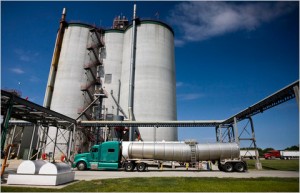There are several proposed amendments to current ethanol tax policy including the VEETC and tariff. Many believe that these incentives will disappear at the end of the year, but what would happen if they were extended? Today, the blender’s credit (VEETC) is 45 cents and the ethanol tariff is 54 cents. According to research conducted by University of Missouri economists, this action would boost corn-based ethanol production as well as corn prices.
Seth Meyer, economist with the MU Food and Agricultural Food and and Policy Research Institute (FAPRI) ran a “what-if” scenario on FAPRI computers. With incentives in place, the results showed fuel production from corn would increase by 1.2 gallons over current production levels and corn prices would increase by 18 cents per bushel. In addition, the model predicts that corn acreage would increase by 1.7 million acres.
 Earlier this year, the team ran the scenario without tax credits and tariffs. However, this time the scenario was run on the assumption that they would continue but did not factor in any changes to current biofuel mandates.
Earlier this year, the team ran the scenario without tax credits and tariffs. However, this time the scenario was run on the assumption that they would continue but did not factor in any changes to current biofuel mandates.
“This analysis looks at an alternative scenario that keeps ethanol tax credit and tariff at current levels,” said Pat Westhoff, director of MU FAPRI. “There is debate about federal support of the ethanol industry. At a Paris meeting last week, G-20-nation trading partners raised concerns about U.S. support of biofuels. The revised baseline gives FAPRI a tool to study proposed policy changes.”
Westhoff notes that U.S. ethanol policy is complex with a broad set of assumptions. It is assumed that the blender of record who receives the tax credit would keep part of the benefit and then share part of the benefit with station owners. From there, it is assumed station owners would pass along the savings to consumers at the pump. In addition, the tax credit is also designed to allow blenders the ability to pay more for ethanol and ethanol producers the ability to pay farmers more for corn. However, this is not always the case.
Westhoff concluded, “Our work suggests that how benefits of the blender’s tax credit are shared among fuel consumers, ethanol plants and corn farmers is very sensitive to market conditions.”

